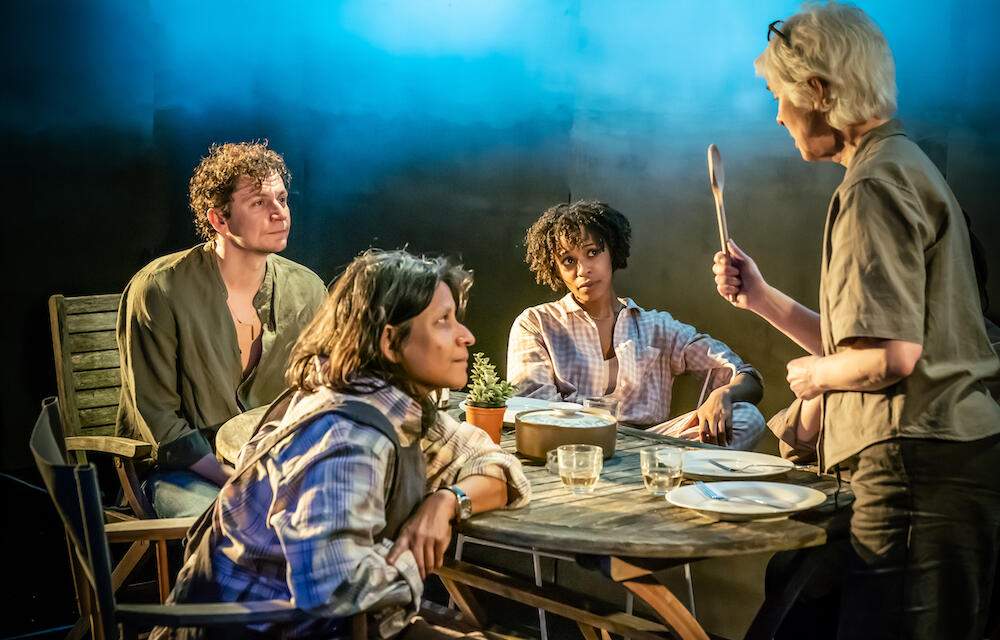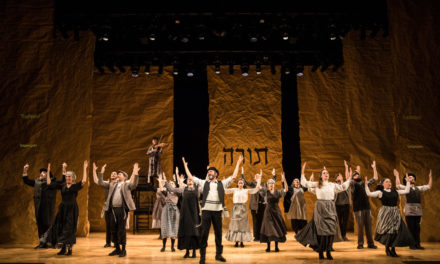Is it possible to successfully challenge naturalism in British theatre today? At a time when audiences crave feelgood dramas, uplifting musicals and classic well-made plays, there is very little room for experimental writing. Still, the Downstairs studio space of the Hampstead Theatre manages to continue to offer an opportunity to go beyond the usual naturalism of traditional storytelling, and this is exemplified by Cordelia Lynn’s new play, which is an experiment in new writing, partly a family play and partly a symbolist drama. While not entirely successful, it does have its good points.
The refreshing thing about Sea Creatures is that it pictures an unusual family situation. In a cottage by the sea, a mother, her lover and two of her three daughters (all from different fathers) spend the summer swimming, cooking and playing charades and Jenga. And making art. Shirley is a middle-aged academic who is also a creative writer, while her partner Sarah is a painter. Living with them is George, the oldest daughter who is seven months or so pregnant, and Toni, the youngest, a rather childlike 22-year-old of mixed heritage who stays all day in her pajamas. Domestic tranquility is disturbed by Mark, a young man seeking Robin — the missing middle daughter.
Mark has known this family for a while, and is in love with Robin. But she is apparently unstable and often disappears. As well as seeking his lost love, he is also an academic who has written a PhD about Shirley’s work, and wants to know what she thinks of his analysis. She is less than willing to enlighten him. Gradually, it emerges that he is as much as victim of trauma as the rest of Shirley’s children, who have suffered from parental neglect. But Mark’s rather busy persona is in contrast to the more laidback women, who drift in and out of the house, occasionally getting down to creative work, often just being.
Lynn writes in a poetic literary way, dreamy passages of lyrical descriptions of the force of the sea, with allusions to folk myths about selkies and mermaids, sitting side-by-side with naturalistic passages about domestic matters. There is a strange sense of almost indefinable loss, exemplified by the sudden arrival of an Old Woman, a mythical creature who is trapped between sea and land. She is looking for her skin, and her final resting place. But this longing is as futile as trying to hold back the tides. Each of the other women also suggest a sense of loss: Shirley might be losing her grip due to Alzheimer’s, George has lost her maternal feeling and is indifferent to harming her unborn baby by drinking and smoking, Toni often destroys the work of Sarah.
This is also a situation with a deep backstory. By showing us a female-only family with problematic children, Lynn suggests that the absence of men and the selfishness of Shirley has had traumatic consequences. This is especially true of Toni, and the flighty Robin, whose sexual adventures are based less on desire and more on desperation. At least according to Mark, and none of the women contradict him. So all the positives of creating a family now headed by a lesbian couple are undercut by the problematic state of Shirley’s children. Nor is Mark any better. His attraction to Robin seems to be an example of damage calling out to damage, and the way he slowly fits into this small female society argues that it represents a safe place where fuck ups are normalized.
A striking feature of Lynn’s writing style is the use of symbolic stories, long metaphor-rich tales which work as set pieces at crucial moments of the play. Not only does this involve the Old Woman, but also there’s Fred the fisherman, an old family friend whose store of stories of the sea carry a salty and folksy tang. Likewise, the play is bookended by a couple of dreams in which Shirley articulates her feelings about the missing Robin. In all of these the sea appears in all its majesty, mystery and terror. With their added themes of homelessness, homecoming and loss, along with an awe in the face of nature, these episodes of storytelling give Lynn’s writing a lot of its particular, strange flavour.
So while the writing has a lovely imagistic aura, its beauty, and its offbeat suggestiveness, don’t really compensate for the unattractiveness of the characters, and lack of a plot with something definite at stake. Okay, I understand that this play is an experiment that challenges the great British tradition of naturalism, but somehow it is neither a straight play nor an absurdist drama. Being neither one nor the other, it is puzzling rather than illuminating. But maybe all leftfield theatre is like that. And while James Macdonald’s production is haunting in its atmosphere, with wonderful lighting by Jack Knowles and sound by Max Pappenheim, his cast have not really found the right melody to do complete justice to Lynn’s words.
Throughout the show’s 110 minutes I sometimes wished that the acting — by Geraldine Alexander (Shirley), Thusitha Jayasundera (Sarah), Pearl Chanda (George), Grace Saif (Toni) and June Watson (Old Woman) — could have been as strange as the text. So while there is much to admire in Zoë Hurwitz’s design, with its simple interiors, shiny kitchen utensils, sea shells and pebbles, it is the charismatic Tom Mothersdale’s troubled Mark who provides the main energy in most of the scenes, and he is given some well scripted asides that suggest the raw violence underneath his pleasing outward demeanour. Other memorable aspects of the production are the sound of the waves, the thunderstorm and the metal lobsters clicking across the kitchen floor. A mysterious show which, for me, didn’t quite work.
Sea Creatures is at the Hampstead Theatre until 29 April.
This post was written by the author in their personal capacity.The opinions expressed in this article are the author’s own and do not reflect the view of The Theatre Times, their staff or collaborators.
This post was written by Aleks Sierz.
The views expressed here belong to the author and do not necessarily reflect our views and opinions.



![Samuel Gallet’s “Mephisto [A Rhapsody]” at The Gate Theatre](https://thetheatretimes.com/wp-content/uploads/2019/10/mephisto-440x264.jpg)














